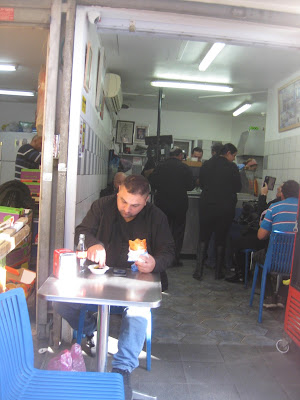Markets and bazaars are not what they used to be, and yet, they attract lots of people through their variety of items, good deals, colorful atmosphere, and fun.
The market of Ramla town is considered one of the oldest, most authentic, and cheapest markets in Israel.
Ramla, a central little town near Tel-Aviv, characterized by a mixed population of jews, arabs, christians, karaites - has quite a few historical and religious sites (see my post on the White Tower, for instance). It also has a museum with a hoard of real gold coins, attractions such as the Pool of Arches (where one can sail in a little boat below ground), and a grave of a british soldier ,named...Harry Potter.
Yet, the fame of Ramla comes from its market- located in the town's Old City, in the area between the central bus station ,the big Mosque, the museum, and the President's garden.
the Great Mosque
If you're looking for some fine spices, ethnic food, hummus eateries, fresh fruit and vegetables, dried fruit, nuts, household items, clothing, arab style antiques - this market is the place.
the Great Mosque
the President's garden
apples, lemons, onions, potatoes, tomatoes
ripe bannanas
avocado, tomatoes, potatoes
herbs
dried fruit, nuts, almonds, spices
Many come here for a culinary experience to sample some turkish bourekas, tunisian sandwich, or "wipe" some hummus off the plate in a 'hole in the wall' type of eatery ('hole in the wall' - not my original expression , I borrowed it from somewhere, but I like it; it's almost accurate). Several bakeries provide bread, pita, rolls, and pastry to those many customers who're shopping around .
"hole in the wall" eatery of tunisian sandwiches
eatery providing various ethnic dishes
bakery
What caught my eye, even more than the displayed merchandise, were people standing in line, reading texts, talking on the phone, or having a friendly chat in the middle of the main market street. See photos below:
reading (?) while in line to buy products
on the phone, what else
muslim girls chatting near a juice selling stall
strong sun
On Wednesdays there are actually two markets - the usual, daily market along Jabotinsky street , and in addition, at a short distance, an open market which is a mixture of cheap clothing/ household items, and a flea market. The latter, a sort of enclave, is not easy" to navigate"; the surface is not flat, and one walks up and down on earth, sand and pebbles.
cheap clothing
household items on the ground
muslim women with shopping bags
flea market (I like the woman's braid)
shoes
It was a tiring day, but nevertheless one of good experience in shopping and social diversity. Markets are still an important meeting point of the rich and the poor, the young and the old, the religios and the secular ,the natives and the newcomers - all looking for a bargain.






























